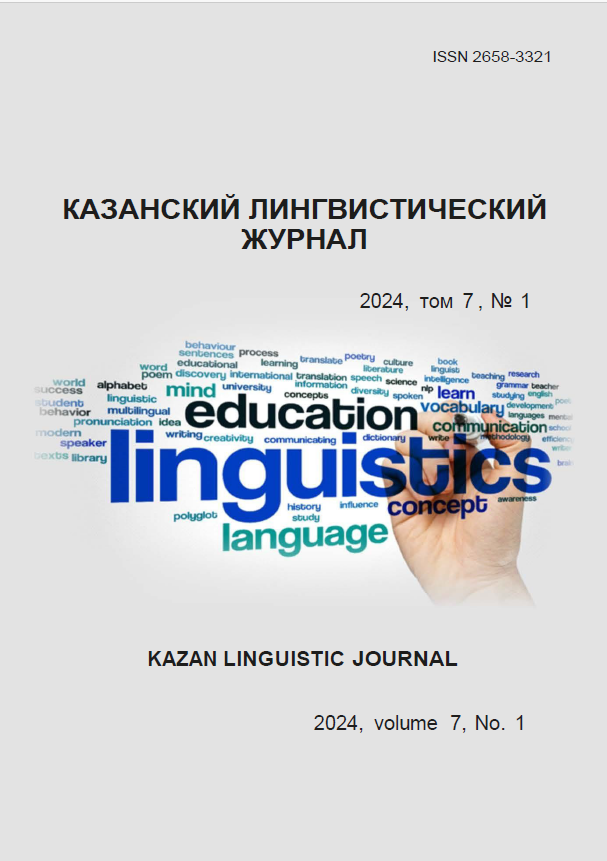Advantages of the Japanese Historical Novel as a Means of Forming Linguocultural Competence
https://doi.org/10.26907/2658-3321.2024.7.1.19-28
Keywords:
linguocultural competence, Japanese language, Japanese historical novel, anticipation, social verticalAbstract
Japanese society has gone through many stages in its development that have made it extremely authentic and different from other ethnic societies. This uniqueness is manifested in the Japanese language, which structure contains many different nuances, making it a unique language system. In this regard, the formation of linguocultural competence, that includes capability of making the most effective communication due to the consideration of extra-linguistic features, is of particular importance in teaching Japanese. There are no full-fledged Russian-language aids aimed at the formation of the competence. Moreover, research of the optimal technology, as well as the choice of appropriate language materials is relevant. In this study, Japanese historical novels are proposed as a means of forming linguocultural competence in Japanese language teaching. This genre flourished in the middle of the twentieth century, and the works belonging to it combine the realistic history of the Japanese Middle Ages and the psychologism of modernist literature. This makes these novels a rich source of linguistic material used in a variety of contexts, which can have a positive impact on the formation of linguocultural competence. In addition, works belonging to this genre clearly demonstrate the social vertical characteristic of Japan, the relationships within which influence the choice of linguistic means. Also, an important advantage of using historical novels in the educational process is the possibility for students to anticipate the content of the subsequent text because the plot is based on historical events.
References
References
Bokova T.N., Morozova V.I. Influence of postmodernism ideas on higher education in Russia. Problems of higher education and modern trends of socio-humanitarian knowledge (VIII Arsentiev Readings).2020:27–31. DOI 10.31483/r-63955. (In Russ.)
Yazykova N.V. A contemporary's view on the evolution of paradigms in tfl method-ology. Foreign languages at school. 2019;5:12–17. (In Russ.)
Tareva, E. G., Tarev B.V. The assessment of students' professional communicative competence: new challenges and possible solutions. XLinguae. 2018;11(2):758–767. DOI 10.18355/XL.2018.11.02.59.
Nosova E.S. Place of linguocultural competence in the system of teaching the native language. Izvestia: Herzen University Journal of Humanities & Sciences. 2008; 37(80):453–456. (In Russ.)
Izotova N.N. Ethno-cultural characteristics of Japanese communication style. MGIMO Review of International Relations [Internet]. 2012;(6(27)):179–82. DOI10.24833/2071-8160-2012-6-27-179-182 (In Russ.)
Abdulmyanova I.R. Formation of professional personal thesaurus as a goal of the professional education. Tomsk state pedagogical university bulletin. 2010;2(92):36–39. (In Russ.)
Bastrikov D. A. Methodological experiment as a tool for the development of lin-guocultural competence of foreign. Kazan linguistic journal. 2022;5(4):437–450. DOI 10.26907/2658-3321.2022.5.4.437-450 (In Russ.)
Zhachemukova B.M., Beshukova F.M. Artistic specificity of the historical novel genre. Bulletin of Adygeya State University. 2011;1:11–17. (In Russ.)
Nechaeva L.T. Japanese language for beginners Part 1. Moscow: Moscow Lyceum; 2011. (In Russ.)
Nechaeva L.T. Japanese language for beginners Part 2. Moscow: Moscow Lyceum; 2016. (In Russ.)
Fedyanina V.A Linguistic and regional studies components in teaching history and culture of japan. Bulletin of Moscow City Pedagogical University. 2010;2:99–104. (In Russ.)
Streltsov D.V. History of Japan. Moscow: Aspect Press; 2018. (In Russ.)
Yoshikawa E. Heike History. Moscow: ZAO Tsentrpoligraf; 2004. P. 606. (In Russ.)
Yoshikawa Eiji. Complete Works. Ch. 33 Tokyo: Kodansya; 1967. P. 487. (In Japa-nese).
Nurgaliev I.R. The concept of "collocation" in Russian, English and Japanese lan-guages. Scientific Start – 2022. 2022;164–169. (In Russ.)
Markovsky, A. V. Actual problems of linguistics and culture of communication. Ka-zan linguistic journal. 2022;5(4):535–546. DOI 10.26907/2658-3321.2022.5.4.535-546. (In Russ.)






